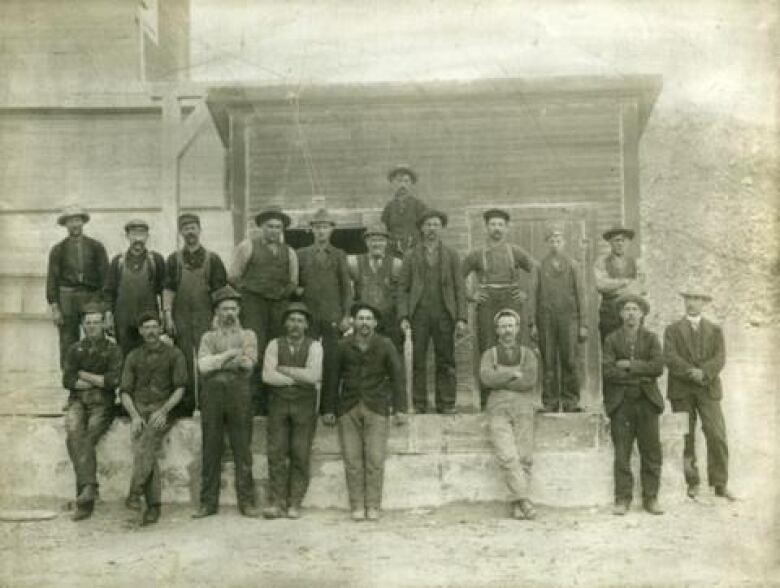Set to be renamed, Asbestos, Que., grapples with history, identity
Built around an asbestos deposit, the town has been stigmatized because of its name

"I was born in Asbestos and I want to die in Asbestos," a man shouts from his car before peeling out of the parking lot.
Outside the only arena in Asbestos, Que., cars are lining up.
The setup looks like an outdoor COVID-19 testing centre, but in fact, residents are there to vote on the town's new name.
Among the contenders: L'Azur-des-Cantons, Jeffrey-sur-le-Lac and Larochelle.
The town council is set to announce the winner on Monday evening.
As one can imagine, the name Asbestos garners a lot of reaction from outsiders, most of it bad, but it is also steeped in history and complicated by language.
Now the town council wants to shed the stigma attached to the name.
'Magical mineral'
The town owes its very existence to asbestos, once touted as a fireproof "magical mineral" by Johns Manville Inc., once a major manufacturer of asbestos products.
In the 1870s, farmer William H. Jeffrey discovered land in the area was full of the natural mineral and opened what became known as the Jeffrey Mine.
"The name Asbestos came because of the history of the town, the reality of the town, that it is located on a gigantic asbestos deposit," explained Jessica Van Horssen, a historian and the author of A Town Called Asbestos.
WATCH | Historian Jessica Van Horssen explains why the town was named Asbestos:
"In the 19th century, the Royal Mail just decided to start calling that place Asbestos."
It became the largest chrysotile asbestos mine in the world, and as it grew, so did the town around it.
"There was a lot of pride in the work that the residents were doing in the mine," said Van Horssen.
"It's very easy for us to forget that there was a time before people knew asbestos was poison."
Crucial to urbanization plans, as well as the manufacture of gas mask filters and insulation for ships during the First and Second World Wars, the mineral was advertised as essential to any building project.

There were inklings of the danger of asbestos as early as the 1900s, but its effect on mine workers was clear by the end of the Second World War. Frequent symptoms like hacking coughs and chest pain led in part to the famous 1949 Asbestos strike at four mines, including the Jeffrey Mine.
The wider health implications of asbestos would come out later — namely, that it caused life-threatening diseases such as asbestosis and mesothelioma. It was declared a human carcinogen by the World Health Organization in 1987.
The Jeffrey Mine closed in 2011, but Canada didn't ban asbestos products until 2018.
Suddenly, being known as the town called Asbestos wasn't so great anymore.

Laughingstock
In 2011, the popular American news satire program The Daily Show aired a segment about Asbestos.
"Does 'asbestos' mean something different in French than it does in English?" comedian and correspondent Aasif Mandvi asked Bernard Coulombe, then the president of the Jeffrey Mine.
"Because in English, it means 'slow, hacking death.'"
It wasn't the first time residents of Asbestos had been made fun of.
"Once upon a time, we have been very proud of that name, but now it's very difficult because asbestos means a fibre that people are afraid of," said Louise Moisan-Coulombe, wife of Bernard Coulombe and mayor of the town from 1997 to 2002.
"Every time you say, especially in the United States, that you are coming from Asbestos, or they read Asbestos on a package, they are always afraid that it will be poison," she said.

Moisan-Coulombe says the name has had economic disadvantages, as well. She said more than one company decided not to set up in Asbestos purely because of the name. Others rented post office boxes in the neighbouring town of Danville so as not to have Asbestos in their address.
"People want to stay here, they want to invest here, but they want another name without that stigma," she said.
Name change not unanimous
Flag down residents after they've voted on the new name, and you'll instantly realize the decision to renounce Asbestos isn't altogether agreed upon.
For many, the name is the town and the town is the name. The only concern is how outsiders perceive them.
Gisèle Boutin notes that when she travelled, people often didn't believe her when she said where she was from.
"They actually backed away from me. Two people actually changed benches — because they were scared? I didn't understand it," she said.
"I think changing the name is a good idea."
Sitting next to her in the car, Gaétan Lemieux doesn't agree.
"At our age, we don't see it the same way as younger people or people in the business world," he said.
"We have ancestors here who died at 100, and they didn't die because of asbestos."
Boutin shushes him and interrupts.
"Well, let's not talk about that. My dad died of mesothelioma," she said.
For others, the issue is that the name is an English one, and a proper noun at that. The problematic mineral is referred to in French as amiante.
According to the 2016 census, 6,786 people live in Asbestos, and 96 per cent of them call French their mother tongue.
"Us older people are all in favour of the name Asbestos. You don't change names for nothing!" grumbled André Thibodeau. The 76-year-old has called Asbestos home his whole life.
Van Horssen, the historian, discovered that sentiment in the course of her research.
"It's more complicated than just 'It's a terrible name, let's change it,'" she said.
"There's a deep history there and real cultural identity entwined in that."


